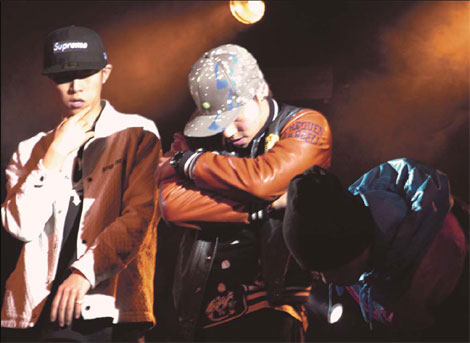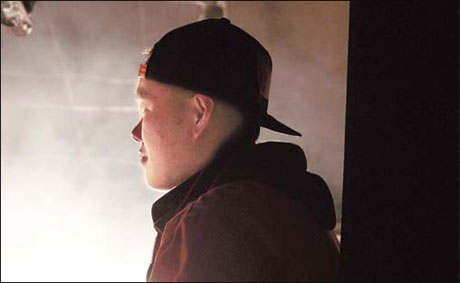From Brooklyn to Beijing, doing hip hop Chinese style
 |
|
Contestants in the Wu Jia Wu Hip Hop Street Dance Competition at Yugongyishan, which was held on Dec 30. [China Daily] |
Like cities all over the world, today's Beijing resonates to beats from the likes of Jay-Z and Kanye West. But what of local hip hop?
A small bar in Gulou's Beiluoguxiang is crammed with rappers, beat-boxers, baggy pants and baseball caps.
Downstairs in a dank graffiti-covered cellar reminiscent of a Berlin squat house, MCs from across the city are battling it out, each verbally outmaneuvering the other to the sound of home-grown beats.
When talking about hip hop in Beijing, it is important to get the terminology right.
Chinese has its own word for hip hop - Xi Ha. But according to Beijinger Naughty Ray, 22, one of the capital's best-known rappers, no true hip hop fan would use it.
"Most Chinese think hip hop doesn't go beyond commercial acts like Eminem and 50 cent, or Jay Chou doing a bit of rapping in his songs," he said.
Naughty Ray said a lot of people call themselves hip hop fans but in reality they're just doing it for the fashion; they think dressing like a gangster will help them find a girl.
"For the music to count as genuine hip hop, you have to be rapping about real issues, like pressure, not having a job, trying to get a car, a place to live, a girlfriend," he added.
On the girlfriend issue, Naughty Ray is definitely doing alright - he sits next to a beautiful girl, immaculately made up in a hoody and sweat pants.
However, the money side is another story. Hip hop artists face numerous difficulties in earning a living.
Many Chinese music lovers don't want to pay for CDs, regardless of the music genre, explained local resident Daxiang, 24, as he asked to be called, who runs the hip hop fansite Diggaz (www.dibc010.com).
Added to this is the problem that some venues pick up a reputation for cheating performers on payment, worked out as a percentage of ticket sales.
For Ray, lack of funds means he has to supplement his income by "hustling", which mainly refers to selling hip hop memorabilia online.
The question remains as why hip hop hasn't become more popular. Daxiang said the answer lies in a lack of media attention, due in part to a need for local artists to mature in their style.
Hip hop first came to China in the 1990s with the screening of NBA games on TV.
"That was the first time we ever heard hip hop," said Daxiang.
"After that, we slowly began to understand more about the culture and what those guys were singing about."
|
|
|
A spectator watches a live hip hop performance from the sidelines. [China Daily] |
In 2000, one of the first local hip hop groups was Yin Cang, a duo originally made up of a Chinese and an American-born Chinese. Since then, many more acts have joined the scene, with Naughty Ray making his first appearance in 2004.
Early Chinese hip hop largely relied on sampling beats from American artists, as many local producers lacked musical proficiency. However, this is no longer the case.
"Right now, I think there are probably about 20 really solid hip hop acts in Beijing," said Ray.
With such low numbers, Ray and Daxiang admit that the scene is still firmly underground.
"Yugongyishan puts on a hip hop night on the last Friday of every month and there are other nights in some other places, but the number of what I would call 'true fans' who really understand what we are about, is low," said Ray.
"We've got some struggling to do but I guarantee that Chinese hip hop is going to be massive."
 0
0 








Go to Forum >>0 Comments